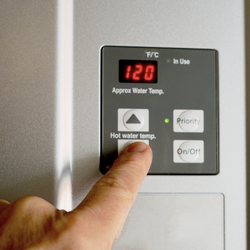Tankless Water Heaters: A Buyer's Guide
Thinking of getting a tankless water heater? To help you decide, we’ll go over:
We’ll cover each topic in more detail.
Need a quote to install a water heater? Call Michael & Son.
Our plumbers will answer any questions you have about water heaters and go over the best tankless options for your family. Then, you’ll get a no-obligation quote to install a new water heater.
What is a tankless water heater?
Tankless water heaters heat and deliver water only when it’s needed. They don’t heat and store water like tank water heaters do.
Also called “on-demand water heaters,” tankless water heaters could theoretically give you an endless supply of hot water—so long as you don’t overload it by running too much water at once.
Like tank water heaters, tankless water heaters have a heating element (which can be either gas or electric) that heats the water. Instead of preheating and storing water, tankless water heaters run water through the heating element when the water gets turned on.
Also, like tank water heaters, you’ll need to make sure a tankless water heater is properly sized for your home’s water use.
How they are sized
Since tankless water heaters don’t store water, they’re sized based on a gallons-per-minute (GPM) rating, which measures how much hot water they can deliver to your home. The higher the GPM, the more hot water the water heater can deliver.
To calculate what size tankless water heater you need, you’ll need to figure out the water flow rate of appliances and fixtures you plan to use at any given time.
For example, if you plan to run the following appliances/fixtures at the same time:
- Shower: 2.5–5 GPM
- Faucet: 2–3 GPM
- Dishwasher: 1–2.5 GPM
- Washing machine: 1–3 GPM
Add all of those GPM rates together, which means you’d need a tankless water heater with a GPM between 6.5 and 13.5.
The exact flow rate you’ll need depends on the type of fixtures you have and the efficiency of your appliances. Higher-efficiency appliances and water-saving fixtures will have lower GPM rates.
Let’s go over how tankless water heaters differ from tank-style water heaters.
Tankless vs. tank water heaters
We’ll compare how tank and tankless water heaters differ in terms of:
- Price: Tankless waters typically cost more to install than tank water heaters but are more energy efficient (helping you save on monthly bills).
- Longevity: Tankless water heaters typically last 15–20 years, while tank water heaters can last 10–15 years.
- Size: Tankless waters are significantly smaller than tank water heaters. This is because tank water heaters have to store water for use, while tankless water heaters run water through the heating element as needed.
- How much hot water they deliver: Tank water heaters can deliver anywhere from 30–80 gallons of water at a time. Tankless water heaters, on the other hand, can essentially deliver an endless supply of hot water.
Learn more about the differences in our blog, “Tank vs. Tankless Water Heater: Which is Best?”
Now that you understand the difference, we’ll get into why many Baltimore homeowners prefer tankless water heaters.
Benefits of a tankless water heater
Compared to tank water heaters, tankless water heaters:
- Are more energy efficient. Since tankless water heaters only heat water as needed—instead of preheating it for future use—they’re roughly 24–34% more energy efficient than tank water heaters (according to energy.gov).
- Take up less space. Because they don’t require a tank to store water, tankless water heaters can fit in smaller areas.
- Last longer. Tankless water heaters typically last 5–10 years longer than tank water heaters. This is usually because water is stored inside the water heater tank, which will eventually corrode the inside.
Wondering how much these benefits will cost you?
How much do they cost?
A tankless water heater can cost anywhere from $1,200 to over $3,800 to install.
The actual cost of your water heater installation increases with:
- Size (measured in GPM)
- Energy efficiency
- Fuel type (gas units are more expensive than electric)
- Extra features
- Warranty length
- The quality of plumber you hire (although they’re worth it in the long run)
Learn more about how much it costs to install a water heater on our blog.
Need a quote for a water heater installation? Call Michael & Son.
At Michael & Son, we offer honest, upfront pricing for all water heater installations. Our Baltimore plumbers provide the best customer service in the area and will discuss your water usage to give you the best water heater options for your home.
This blog was written on Oct 19, 2021. Any pricing information is subject to change.


